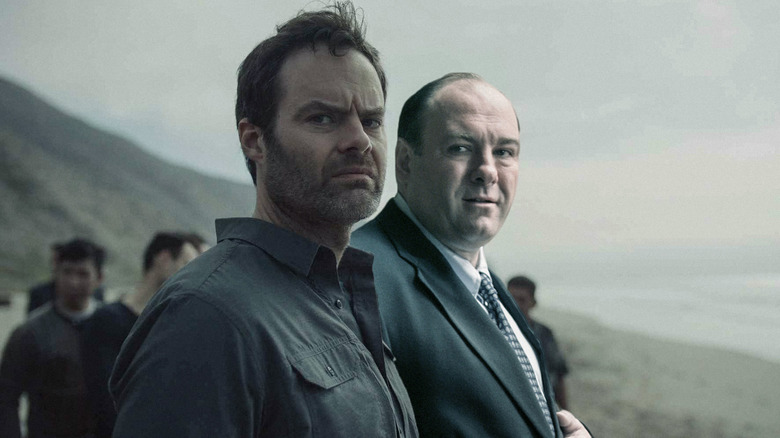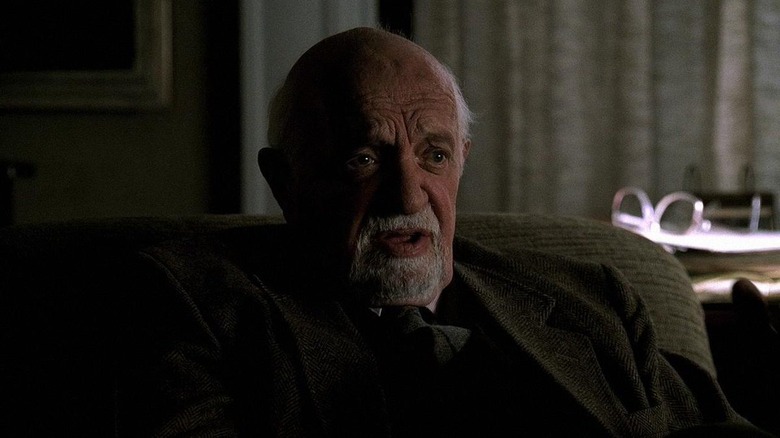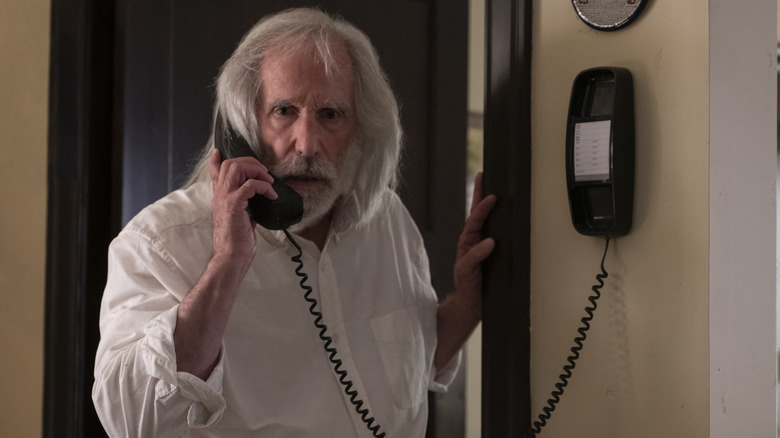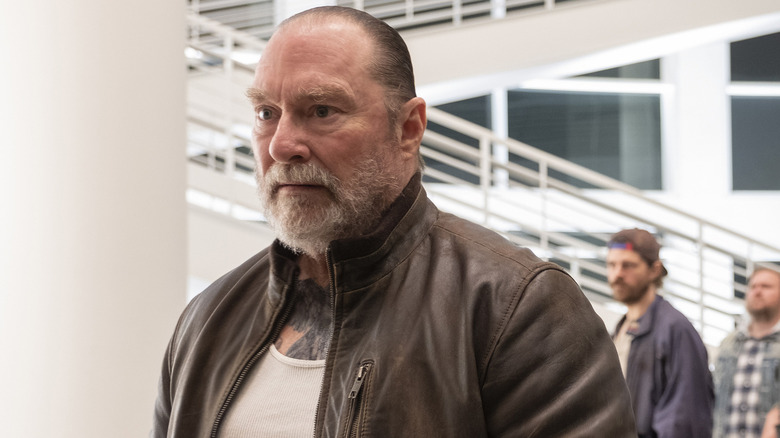Barry And The Sopranos Ask The Same Question, But Have Different Answers
This article contains spoilers for the "Barry" series finale.
One of my favorite episodes of "The Sopranos" is "The Test Dream," in which Tony (James Gandolfini) falls asleep in a hotel room and has a surreal dream. Whenever "The Sopranos" needed to be especially foreboding, it went to dream sequences. Season 6 features a multi-episode one when Tony, in a coma and on death's door, has a vision of an alternate life for himself as a law-abiding middle-aged salesman. That's why when "Barry" started going surreal in season 3 — our eponymous protagonist (Bill Hader) saw himself standing on a beach alongside all his victims — my mind jumped to "The Sopranos."
The two HBO shows have more in common than you'd think, down to the same guiding question: can people change? "The Sopranos" is at its core about a man in therapy, a process that is supposed to help you reshape yourself. "Barry" is likewise about a criminal trying to turn over a new leaf, but with performing as his cure. After all, in acting you discard yourself and take on a new face.
Intersecting with Barry's story is that of Gene Cousineau (Henry Winkler), his washed-up acting teacher. Gene has made a complete mess of his family and career, so he wants to make amends with those he's hurt, from old colleagues to his son Leo (Andrew Leeds).
"I pray that human beings can change their nature, because if they can't then you and I are in deep trouble," said Gene to Barry back in season 2. In "The Sopranos," the answer to that prayer is a "no." In "Barry"? I would've said the same until the finale, "wow," proved me wrong in the most unexpected of ways.
Faux-therapy in 'The Sopranos'
"Sopranos" creator David Chase spent time in therapy himself, so he has an inside perspective on the process. For any number of reasons (not putting in the work, seeing the wrong doctor), therapy has the potential to go wrong. It can just lead to you rationalizing your bad behavior instead of fixing it. That's exactly what happens with Tony. The root of his problems, from violence to existential dread, is that he's in the mafia. He's not willing to leave the mob, so he can never really change.
After the aforementioned near-death experience in season 6, Tony makes the most earnest effort to be different. He tries to be more generous, stops cheating on his wife Carmela (Edie Falco), and decides to view every day as a gift. This attitude lasts for a couple of episodes before his frustration piles up and he stops trying. "Kennedy & Heidi," when Tony murders his nephew/protégé Christopher (Michael Imperioli) and can't even pretend to be sad, is his lowest point.
In the series' penultimate episode — "The Blue Comet" — Dr. Melfi (Lorraine Bracco) reads the psychological study "The Criminal Personality." She realizes that in her seven years of treating Tony, she's just been abetting him. Thus, their next session is their last; the final, pointed shot of Melfi is her closing her office door after Tony walks out.
"The Sopranos" is littered with other cases of characters refusing to change, from Vito (Joseph Gannascoli) choosing the mob life because he can't stand normalcy, Ralph (Joe Pantoliano) possibly killing a horse after supposedly setting out to be a better person, Christopher selling out his girlfriend Adriana (Drea De Matteo) rather than abandoning the mob lifestyle, and most of all, Carmela refusing to leave Tony — and his life of comfort — even when confronted with her complicity in his sins.
Wearing a new face
"Barry" starts out as a comedy first and foremost, but it gets darker because after season 1, it's clear that Barry's quest for redemption is doomed.
After the time jump, everyone is someone different — Barry and Sally (Sarah Goldberg) are "Clark and Emily," the normal parents of John (Zachary Golinger). Gene has given up acting and is instead crusading for the legacy of his late girlfriend Janice Moss (Paula Newsome). Hank (Anthony Carrigan) has become a legit businessman instead of a mobster, while Fuches (Stephen Root) has embraced "The Raven," his gang leader alter ego. They're all just acting, with the world as their stage.
Like any actors, their masks slip. Barry chooses violence when it looks like Gene is reopening old wounds. Until the very end, he resists turning himself in and taking responsibility; only after Sally and John leave him does he consider it, but Gene shoots him first. Gene, as always, dug his own grave by chasing fame and listening to his impulses. Hank, who can't admit his culpability in the death of Cristobal (Michael Irby), fails his final test and dies embracing his lover's bronze memorial.
However, the finale also surprised me by giving Fuches some redemption. He saves John from a shootout, leads him back to his father, and after a silent glance with Barry, he makes a clean exit into the night. The central thesis of "Barry," about people's ability to change, lies in Fuches' arc.
Change takes honesty
Fuches is the most despicable character in "Barry." For all of Barry's own sins, Fuches is the one who steered him onto a violent path. Fuches' arc in season 4 has been about him realizing this. He tells Hank that while he was in prison, he finally realized who he was: not a soldier or a mentor, but "a man with no heart."
In an interview with /Film, Stephen Root called this monologue, "the crux of the show [...] As Bill says, by the end of the show, everybody is someone else." However, this doesn't mean they all change for the better. Only Fuches and Sally end the series both alive and free, and their actions in the finale show why.
In "Barry," it is possible for people to become better versions of themselves. To do so, though, they have to be honest about who they are in the first place. In "wow," Sally admitted her faults to John, apologized for being a bad mother, and finally left Barry for good. By admitting her sins, she can grow past them. Barry, however, was never honest with himself. His efforts were always about pretending to be somebody else, so he could never really grow as a person.
"Barry" seasons 1-4 are now streaming on Max.



